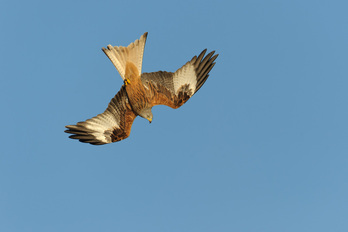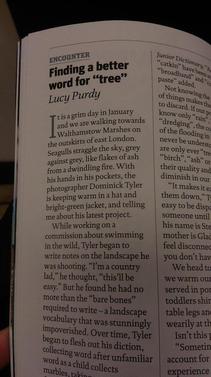in which I meet Elaine and Vineeta of the OUP
 Chris Gomersall (rspb-images.com)
Chris Gomersall (rspb-images.com) I made me feel old, and excited that only by being old can I remember the effort it took to see my first red kite: a distant, fleeting view from across Tregaron Bog; and in the rain and through cheap binoculars. I can see that bird vividly as I write this. In a week’s holiday in Wales it was the only kite we saw, and I imagine my parents were as relieved as I was thrilled. Now that you can see kites alongside the 13:20 from Paddington to Oxford, or from the A1 anywhere between Stevenage and Newark, the excitement should have lessened by now. But no, I ritually record every RK sighting, each bird a monument to conservation success.
The return trip was in the dark, so I opened the New Statesman to read Lucy Purdy’s (a Twitter friend I know mainly as @loosepea) article about Dominick Tyler (whose Twitter handle @TheLandReader tells you all you need to know). That’s how I learned a new natureword: witch’s knickers – about which (ahem), more anon.
The meeting started with a bit of wordplay: the OJD had not been amended, it had been repositioned it seems, which I understood meant it was a different dictionary with the same name. Whatever, you won’t find acorn, bluebell, conker or another 51 nature words once, but no longer, deemed fit for inclusion.
So we moved on, and into more encouraging territory. The lexicographical rigour that led to the nature word cull includes the ability to interrogate the corpus, a nice old Oxfordy word that refers to an enormous database of usage. It includes some 400,000 essays and stories written by children, along with the books written for them. I have been invited to suggest some words that can be more closely investigated, to see whether the corpus reveals an importance hitherto overlooked.
I don’t know whether to raise my hopes that this may lead to some nature words being reinstated when the OJD is next repositioned, but I gather that is a possible outcome of the process.
Elaine and Vineeta wanted to persuade me that their children’s book catalogue included some great nature literature. I wanted to persuade them that they didn’t need to. I was already persuaded. In fact, my big problem, as I explained, is that I think the OUP is great. It just made one mistake, in the routine course of its work; and that was to allow itself to be swept along by one of society’s most alarming trends: the decline in connectedness between children and nature. To be a symptom when I dearly want it to be part of the cure.
Oliver Rackham
A few years later his History of the Countryside set a new benchmark for communicating a passion for nature. Exploring the natural and man-made features of the land - fields, highways, hedgerows, fens, marshes, rivers, heaths, coasts, woods and wood pastures - he gives a fascinating account of the ways in which people, fauna, flora, climate, soils and other physical conditions have played their part in the shaping of the countryside.
The temptation to link the passing of a great authorial champion of of the countryside with the concerns of a new generation of writers is unavoidable.

For Lucy there is a link with the #naturewords campaign. For me, one passage in particular leaps from her article: Not knowing the names of things makes them easier to discard. If our politicians know only “rain”, “silt” and “dredging”, the complexity of the flooding in Britain will never be understood.
Now there's a bullseye of an observation. It was precisely this lexical vacuum that enabled Eric Pickles to invent hydrological orthodoxy in the space of a TV soundbite. In the Somerset Levels it risked undoing years of relationship-building and ensuring that whatever long-term policies are established, they will probably be wrong.
It is a specific example of the fear expressed at the start of the campaign by Mark Cocker: “if we lose the language we will eventually lose the land itself”. Mark is another author who shares Oliver Rackham’s explorer’s zeal for land and language.
a lexicon of society's failure but also of our hope
Mark Cocker has an interesting new take. "We should see those 54 nature words as silent monuments around which to build a campaign" he suggests. "Why should OUP be deflected from their own lexical judgements just because we don’t like the idea those words have lost currency? Maybe making the missing 54 a lexicon of society’s failure but also of our hope might be stronger – more useful out than in, perhaps."
 RSS Feed
RSS Feed
